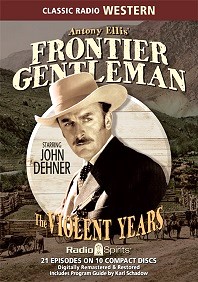
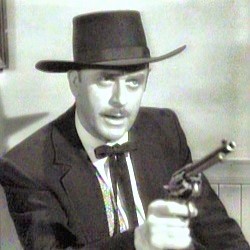 Frontier Gentleman (February 2, 1958–November 16, 1958) aired “Belle Siddons Strikes Back” on August 31, 1958 as the 30th of the short-lived series’ 41 episodes.
Frontier Gentleman (February 2, 1958–November 16, 1958) aired “Belle Siddons Strikes Back” on August 31, 1958 as the 30th of the short-lived series’ 41 episodes.
(This is the third of four episodes featuring Belle Siddons. We showcased the first episode, “Madame Belle Siddons, Confederate Spy” (aka “The Gambling Lady”) here. Last week we ran the second in the story-arc, “Belle Siddons’, Encore” here. You have the third episode before you this week, and next week we will run the concluding episode of the Belle Siddons’ stories.)
Since there are always those coming for the first time to any individual episode of any program showcased here from week to week, below is the general background, the overview, of the program, at the end of which there will be a few specific comments on this episode of Frontier Gentleman.
The brief duration of this quality western (10 months) had more to do with the fact that by 1958 television had become the dominant entertainment venue in America, and this new medium was already into reruns of any number of TV westerns. Frontier Gentleman, while not groundbreaking as was Gunsmoke (on radio and TV, for instance), and while exhibiting a novel approach of its own when it came to character over action in most cases, still could not break through the glass ceiling—or glass television screen—and last longer than it did.
Speaking of the novel approach the series took in portraying the western, its protagonist was of a different stripe altogether. This so-called frontier gentleman was an Englishman. His name was J. B. Kendall and he had spent most of his career as a British Cavalry officer in the Punjab region of Northwest India/Eastern Pakistan. He accepts a position as a correspondent for The London Times to travel to the Wyoming and Montana territories of the still-forming United States in the post-Civil War 1870s. His mandate is to report first-hand what he sees and learns of this still untamed land, with its warring Indian tribes, sometimes successful, often-times failing bouts of exploration, colonization, and pretty much still lawless time in the young country.
The inestimable TV, film, and radio actor John Dehner (1915-1992, photo top right) would win the role of J. B. Kendall and he played it to perfection, even answering the question as to why his British accent seemed almost unnoticeable. Dehner’s distinctive voice was one of his recognizable calling cards across his numerous radio appearances, placing him in the top rank of favorite radio voices along with those of Orson Welles, William Conrad, and Frank Lovejoy. Non-plussed when this top-notch western series was cancelled, Dehner was hard at work on another western series within a week, none other than Have Gun—Will Travel, as the well-educated but tough gun-for-hire, Paladin. For more on Dehner’s background, of which I found numerous items of interest, click on the Have Gun—Will Travel link above. John Dehner died in 1992 of complications from emphysema and diabetes.
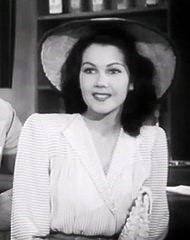 Jeanne Bates (1918-2007) would play Madame Belle Siddons in a four-story arc beginning with this episode, and would finish the arc in episodes 29, 30, and 31. Bates had a remarkable career in radio, TV, and film. Among some of her notable roles were (in no order): Murder Will Out & Gunsmoke (radio), Peter Gunn, Sky King, The Lone Ranger, 3 appearances on Perry Mason in 1960, Ben Casey, and Rawhide (all on TV), and a few notable films she appeared in were The Strangler (1964), Suppose They Gave a War and Nobody Came (1970), Eraserhead (1977), and of the four films near the end of her career she had small parts in, two were Die Hard 2 (1990), and Mulholland Drive (2001). Jeanne Bates died of breast cancer in 2007.
Jeanne Bates (1918-2007) would play Madame Belle Siddons in a four-story arc beginning with this episode, and would finish the arc in episodes 29, 30, and 31. Bates had a remarkable career in radio, TV, and film. Among some of her notable roles were (in no order): Murder Will Out & Gunsmoke (radio), Peter Gunn, Sky King, The Lone Ranger, 3 appearances on Perry Mason in 1960, Ben Casey, and Rawhide (all on TV), and a few notable films she appeared in were The Strangler (1964), Suppose They Gave a War and Nobody Came (1970), Eraserhead (1977), and of the four films near the end of her career she had small parts in, two were Die Hard 2 (1990), and Mulholland Drive (2001). Jeanne Bates died of breast cancer in 2007.
Noted radio scripter Antony Ellis (1920-1967) was born English but became a naturalized American citizen. He capped his unbridled fascination for the American Old West by writing each episode of Frontier Gentleman. They were noted for their historical accuracy and depth of character development within the half-hour time restriction. He and series star John Dehner were good friends in real life. Antony was married to Georgia Ellis (1917-1988), who starred as Kitty in radio’s Gunsmoke.
Future award-winning film composer Jerry Goldsmith (1929-2004) would be responsible for the show’s musical theme. Of his many film scores, a few of the more recognizable would include Alien (1970), L. A. Confidential (1997), Patton (1970), The Sand Pebbles (1966), The Wind and the Lion (1975), Chinatown (1974), Planet of the Apes (1968), Logan’s Run (1976), Star Trek: The Motion Picture (1979), and The Lost World: Jurassic Park (1997). From his wiki page, “Over the course of his career, Goldsmith received 18 total Academy Award nominations, making him one of the most nominated composers in the history of the Awards. Despite this, Goldsmith won only one Oscar, his score for The Omen (1976). This makes Goldsmith the most nominated composer to have won an Oscar only on one occasion.” Jerry Goldsmith died of colon cancer in 2004.
As setup to this episode, a brief synopsis will prove helpful for those having not heard the prior episode, so a truncated recap of last week’s storyline is in order, after which this episode will provide answers to any dangling plot threads left hanging from the prior episode. From last week’s episode: “This episode involves an old flame of Belle’s who may or may not be involved in an upcoming gold shipment robbery and the sheriff who knows Belle might know more than she is letting on. Belle flirts with Kendall while at the same time trying to stay on the right side of the law, but the episode ends before we learn if the gold shipment will be robbed and by whom (Belle’s old flame?). Belle Siddons is an intriguing woman, former Confederate spy and now legitimate owner of a traveling gambling enterprise, set up to do business now in Deadwood, Dakota Territory, where she finds herself befriending the equally intriguing Englishman, a transplanted correspondent for The London Times, one J. B. Kendall, a true Frontier Gentleman.” Enjoy this third episode. It is replete with action, danger (at least one bad guy is shot to death), and some smart dialogue that should keep you listening.
(The linked CD at the top includes this episode, along with the other 3 Belle Siddons episodes.)
Play Time: 24:33
{Airing on a Sunday, this would be the neighborhood gang’s last trip to the corner newsstand the next day before the new school year would commence. Very few Western pulps remained in 1958 so they picked up one they hadn’t seen before along with a couple of SF pulps they had somehow missed on previous visits. Top Western Fiction Annual (1950-58) included some of the best western stories its editor could find. That this issue was its last supports the observation that most western pulp magazines had disappeared down that final dusty trail by 1958. Vanguard Science Fiction (June 1958) was a lucky find with its June 1958 cover date, but one of the gang found it by flipping through several stacks of pulps to find this one lone issue. While the magazine was edited by esteemed SF author and critic James Blish, and had columns by Lester del Rey and L. Sprague de Camp, for some odd reason the story goes that the distributor pulled his support for the magazine almost before this first (and last) issue hit the stands. Venture SF (1957-58, 1969-70) ran for all of 10 issues in its first incarnation and only 6 in its final iteration. It was published by Joseph Ferman (father of Ed Ferman) initially as a companion magazine to The Magazine of Fantasy & Science Fiction and was edited in the 50s version by Robert P. Mills and in the 1969-70 version by later F&SF publisher/editor Ed Ferman. While sales for both versions were below expectations, the magazine managed to publish some quality material by the likes of Isaac Asimov, Leigh Brackett, Clifford D. Simak, Marion Zimmer Bradley, Theodore Sturgeon, Gordon Dickson, Keith Laumer, Dean R. Koontz, Edmond Hamilton and a host of others. It produced 4 bi-monthly issues in 1958, the cover below being the last of the 1957-58 run.}
[Left: Top Western Annual, 1958 – Center: Vanguard SF, 6-58 – Right: Venture SF, 7-58]
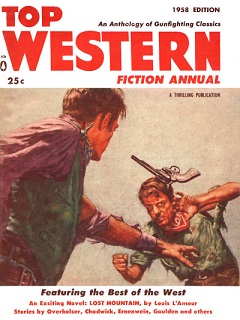
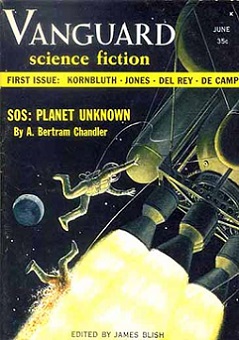
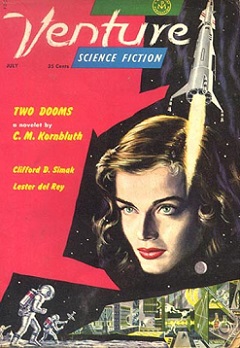
To view the entire list of weekly Old Time Radio episodes at Tangent Online, click here.